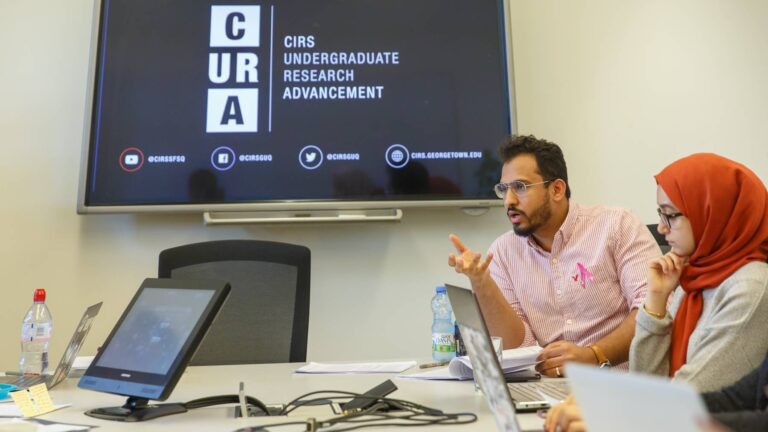Regional Studies, Student Engagement
CURA Seminar: Informal Politics in the Middle East

In October 2018, the Center for International and Regional Studies (CIRS) held a CURA Seminar under its CURA (CIRS Undergraduate Research Advancement) initiative. Each semester, CURA Fellows come together for an active discussion of research papers that were submitted to a current CIRS research project. The papers are shared in advance of the seminar, and CURA fellows attend prepared to critique the papers that they have read. At a later stage, selected CURA fellows attend a CIRS scholarly research working group to share fellows’ feedback with the paper authors. CURA was introduced to support the research needs of undergraduate students at Georgetown University in Qatar, and to provide them with opportunities to enhance their research skills by discussing and critiquing papers from CIRS research initiatives. This CURA seminar was under CIRS’ research initiative on “Informal Politics in the Middle East,” where the CURA fellows discussed two papers addressing the blurred line between formal and informal politics and how it shapes government and society within Yemen and Turkey.
Abdul Rehmaan Qayyum (class of 2021) kicked off the CURA Seminar discussion by presenting Charles Schmitz’spaper titled “Weighing the Tribal Factor in Yemeni Politics.” The paper discusses the role of tribes in Yemeni politics. In the North, the Houthi tribe exploits tribalism in pursuit of legitimacy and power, while the South rejects the tribal system, perceiving it as an uncivilized system. Schmitz addresses the role of tribalism while juxtaposing it with the role of Saudi Arabia, the different political parties (such as the Islah party), militias, and the Hadi government. Schmitz claims that tribes function across state institutions. Tribal sheikhs participate in the government and parliament, control areas out of the weak Yemeni state’s reach, and collect taxes on behalf of the state. However, tribes are not the sole actors in Yemeni local politics. External actors, such as Saudi Arabia; local political parties; and the conflicts within the government all factor into shaping Yemeni politics, even more so than tribalism.
Khansa Maria (class of 2021) presented Michelangelo Guida’spaper titled “Çay Politics: Informal politics in Turkey and the Example of Vote Mobilization in Istanbul and Şanlıurfa.” The paper conveys the power of informal politics in Turkey, focusing on the cities of Istanbul and Şanlıurfa. In the aforementioned two cities, political parties’ campaigns and manifestos are less effective in swaying voters toward a specific candidate during elections. Community leaders and voters’ communal affiliations play a much more effective role in influencing public votes. Guida mentions how in a survey conducted in 2005 by the Reuters Institute Digital News Report in the district of Üsküdar Kadıköy and Küçükçekmece portrayed the impact of media on voters, highlighting that 33 percent of people mistrusted TV, and over 50 percent mistrusted the media and preferred to listen to their community leaders and which candidate they support for reference. As a result of the public mistrust in media and the role of community in Turkish politics, several political parties, particularly the AK Parti, use informal space to win votes. Instead of organizing big media campaigns and rallies, these political parties interact with voters face-to-face, and organize community events as unconventional ways of campaigning.
Subsequent to each paper presentation, the CURA fellows engaged in an insightful discussion on the structure and organization of the paper, the employed theoretical and conceptual frameworks, the sources used, and the clarity and strength of the argument. While focusing on the concept of informal politics and its relationship with formal politics in the Middle East, the CURA fellows employed the theories and research tools and skills of their respective majors—namely international politics, culture and politics, international economics, and international history—to assess, critique, and provide feedback on the discussed papers.
Following the CURA Seminar, Chaïmaa Benkermi (class of 2021) and Riham Mansour (class of 2019) presented the CURA fellows’ comments and feedback at CIRS’s second working group on “Informal Politics in the Middle East.”
- For the participants’ biographies, please click here
Article by Hala Eid, CURA Publications Fellow at CIRS